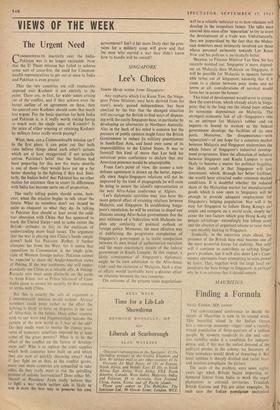SINGAPORE
Lee's Choices
SIMON HEAD writes from Singapore:
Any'euphoria which Lee Kuan Yew, the Singa- pore Prime Minister, may have derived from his state's newly gained independence, has been checked by the fear that the changed situation will encourage the British to find ways of dispens- ing with the costly Singapore base, in particular by developing an alternative in Northern Australia. Also in the back of his mind is concern lest the pressure of public opinion might force the British Government to reduce its military commitment in South-East Asia, and hand over some of its responsibilities to the United States. It was to forestall this kind of move that Lee held his notorious press conference to declaie that any American presence would be unacceptable.
From Lee's point of view, the sooner a new defence agreement is drawn up the better, especi- ally since Anglo-Singapore relations will not be improved by the kind of propaganda he will soon be using to secure the island's representation at the next Afro-Asian conference at Algiers.
• - Lee's diplomatic activities may also have the more general effect of straining relations between Malaysia and Singapore. In establishing Singa- pore's reputation, he will be anxious to dispel any illusions among Afro-Asian governments that the past existence of a federation with Malaysia im- plies any similarity of political outlook or foreign policy. Moreover, the most effective way of publicising the progressive complexion of Singapore's government is to invite comparison between its own brand of authoritarian socialism and the more reactionary nature of the federal government in Kuala Lumpur. In this respect, a likely consequence of Singapore's diplomacy might be its own admission to the Afro-Asian fold—and the exclusion of Malaysia. Such a state of affairs would inevitably have a divisive effect on relations between the two countries.
The outcome of the present trade negotiations will be a reliable indicator as to how relations will develop in the immediate future. The talks were entered into soon aher 'separation' to try to avert the development of a trade war. Unfortunately, they are jeopardised by the fact that the Malay- sian ministers most intimately involved are those whose personal animosity towards Lee Kuan Yew and his policies is particularly bitter.
Because. as Finance Minister Tan Siew Sin has recently pointed out, Singapore is more depend- ent on Malaysia than Malaysia on Singapore. it will be possible for Malaysia to squeeze favour- able terms out of Singapore, knowing that if it came to a choice between poor terms and no terms at all, considerations of • survival would force her to accept the former.
This kind of development would serve to streng- then the conviction. which already exists in Singa- pore, that in the long run the island must reduce its economic dependence on Malaysia. The strongest economic link of all—Singapore's role as an entrepot for Malaya's rubber and tin exports—is bound to weaken as- the federal government develops the facilities of its own ports. Moreover, the disappearance—with `separation'—of any hope for a common market between Malaysia and Singapore undermines the whole future of Singapore's industrial develop- ment programme. Since the allocation of industry between Singapore and Kuala Lumpur is now likely to become a matter for political haggling. the likely result is that Singapore will lose investment, which, through her better facilitieS,I she would have attracted under common market conditions. It is doubtful whether the reduced share of the Malaysian market for manufactured' goods which is now open to Singapore will be enough to provide adequate employment for Singapore's bulging population. Nor will it be easy for Singapore to follow Hong Kong's ex-1 ample and compete on a world scale, simply be-' cause the two factors which give Hong Kong its unique advantage—exceedingly low labour cost and the absence of organised unions to raise them; —are notably lacking in Singapore.
Ironically, in the uncertain years ahead, the presence of the British base may become one or the most powerful forces for stability. Not only will it continue to contribute to solving Sing,t- pore's problem, but it will also deter Lee's Com- munist opponents from attempting to seize power by force. That, together with the large local e\ penditure the base brings to Singapore, is perIvils why he is so anxious that it should remain.






























 Previous page
Previous page